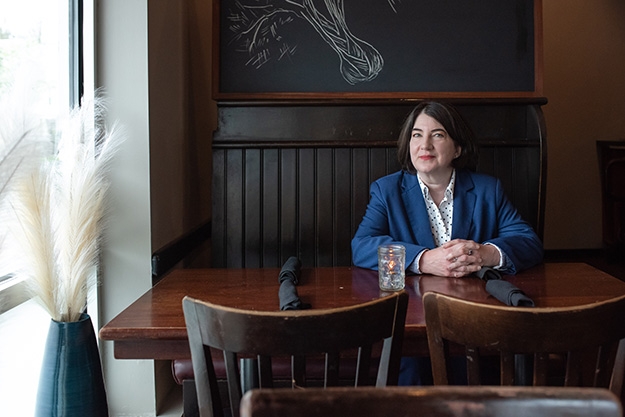Restaurateurs – and their employees – have suffered a lot during the COVID pandemic. There’s really no other way to say it.
Few understand this better than Melissa Fleischut ’90. As CEO of the New York State Restaurant Association (NYSRA), she’s been at the forefront of helping restaurants survive and adapt.
“Leading NYSRA during the pandemic has been stressful, emotional and exhausting,” said Fleischut, who has been CEO since 2013. “Listening to the struggles of restaurant owners as they tried to keep their doors open, their staff employed and their families fed has been truly heartbreaking.”
The association, whose membership includes several thousand New York restaurants, protects the hospitality industry through advocacy, supporting businesses with events and education, and providing key training and cost-saving programs. The goal, Fleischut said, is to make a restaurant owner’s job easier, and make their business the best it can be.
To carry out this mission during the pandemic, NYSRA began holding weekly calls for members and non-members. Association staff provided updates on the latest rules and restrictions, and best practices on what was working. A nightly email was also launched, compiling everything NYSRA staff learned into one message so that members would not have to comb through multiple sources of information.
“Lastly, we told their story to anyone who would listen,” Fleischut said.
This included working with the National Restaurant Association on federal programs, like the Payroll Protection Program, Economic Injury Disaster Loans, Employee Retention Tax Credit and the Restaurant Revitalization Fund.
“We did hundreds of press interviews and met with state legislators and government officials on any issue that needed to be addressed,” she added. “We proposed – and succeeded in getting – outdoor dining open even earlier than indoor dining, and we constantly advocated for restrictions to be eased or lifted.”
The popularity and success of outdoor dining offered some salvation and was one of the biggest wins for restaurants early in the pandemic. Another was alcohol to-go.
“Allowing alcohol to-go through most of the pandemic, and now as we try to rebuild, was a lifeline for many small bars and restaurants,” Fleischut said.
Yet challenges persist, even three years into the pandemic.
“Inflation has increased the cost of food, goods, services, labor, energy and rent,” Fleischut explained. “While some of the costs can be passed along in higher prices to customers, restaurants know that if they raise prices too much, their guests will dine elsewhere or simply stay home.”
To help, NYSRA is working hard to find every dollar for its members – from split case fees and delivery fees to credit card swipe fees. It’s offering a manufacturers rebate program for its members as well.
“We’ve also launched new benefits during the pandemic to help our members retain their employees,” Fleischut said. “We now offer more mental health resources, 24-hour access to health care providers, and we are launching a new 401K program for our members.”
With these programs, and the nature of restaurants owners themselves, she is hopeful about the future.
“New York restaurant owners and employees are some of the most creative anywhere. They constantly adapted their businesses to keep going no matter the obstacles,” Fleischut said. “I was also impressed by the generosity of some of our members, who created brand new programs to feed frontline workers in hospitals, restaurant employees and food-insecure residents in their own neighborhoods.”
Fleischut has worked with NYSRA most of her career, having started out in the National Restaurant Association as an intern – a job she credits to a Union professor.
“After receiving my master’s degree from George Washington University in international affairs, I had a good academic resume but no real-world experience,” she recalled. “Professor Gati recommended I take an internship to gain the experience I needed.”
“I listened and took an internship in the government affairs department of the National Restaurant Association.”
This led to a full-time job in state relations, which a few years later, led to a job in New York.

